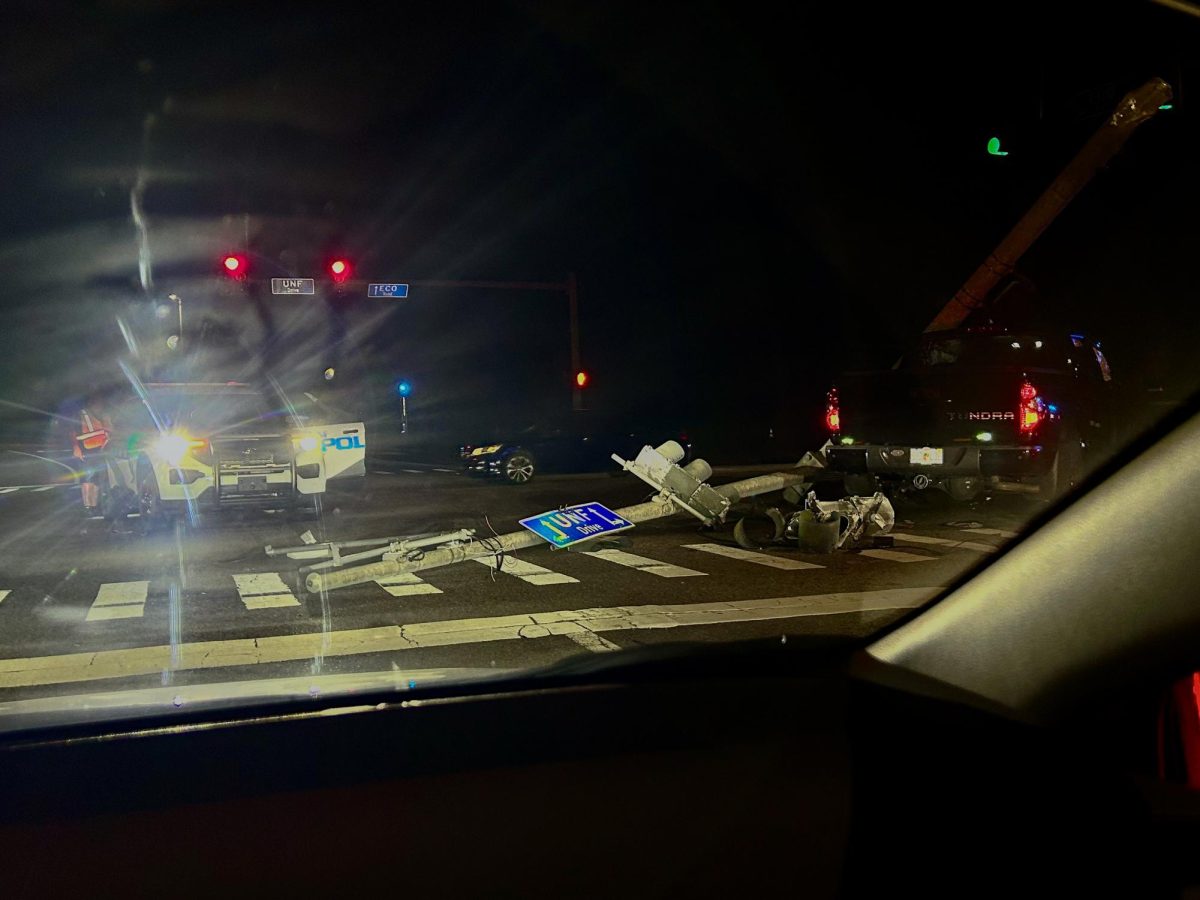 Saman Naeem began wearing her hijab when she was a sophomore attending Jacksonville’s Paxon High School. The UNF public health junior loved what the hijab symbolized in Islam, even though the traditional Islamic head covering is not as strictly enforced for women to wear as in the past.
Saman Naeem began wearing her hijab when she was a sophomore attending Jacksonville’s Paxon High School. The UNF public health junior loved what the hijab symbolized in Islam, even though the traditional Islamic head covering is not as strictly enforced for women to wear as in the past.
When Naeem first started wearing a hijab, she could not help but notice the constant looks from other people, but during college, she has gotten used to the fact her clothing intrigues people.
“There’s all those people who want to stare, and I understand, it’s different,” Naeem said.
Naeem said she is proud to be a Muslim, but like many other Muslims, she feels her people are being wrongfully persecuted for the actions of a small sect many do not consider Muslims.
“There’s radicals in every faith. Islam is basically a very peaceful religion,” Naeem said. “Anybody who does not go about that then they’re not following what I follow.”
A distinction needs to be made between the average Muslim and the Islamic extremists responsible for the terrorist attacks on 9/11. Islam continues to come under fire by religious groups that accuse Muslims of causing the terrorist attacks on 9/11. Even Pastor Terry Jones of the Dove World Outreach Center in Gainesville, Fla., named 9/11 as “International Burn a Quran Day” and hopes to have people rally to burn the religious text of the Islam faith. Meanwhile, the Islamic community center planned for construction in New York has continued to spark debate over the emotional sensitivity of the center’s construction.
Even with the backlash toward Islam, Muslims continue to make efforts to spread knowledge of their faith during their month of prayer and fasting.
Ramadan, the Islamic holy month, began Aug. 11 and acts as a month of peace and spiritual guidance for Muslims across the world, even while Muslims continue to receive harsh criticism and accusations of hidden agendas and terrorism. As opposing sides fight, Muslims are praying and fasting during the daylight hours to become spiritually closer to Allah and to empathize with less fortunate individuals.
Naeem starts her morning the same each day during Ramadan. As a practicing Sunni Muslim, she eats a bowl of cereal and prays the first prayer, the Fajr, in order to prepare herself for the fasting that takes place until sunset. As she goes about her day, she takes time to perform the other four prayers: Dhur, Asr, Maghrib and Isha’a. These five prayers make up the Salat, one of the five pillars of Islam. Other pillars of Islam include the Hajj, which is a required pilgrimage to Mecca.
“It’s always my favorite time of the year. You try so much harder to be a better person,” Naeem said. “It’s very spiritual, and I love it.”
With Jacksonville being home to a predominantly Southern Baptist religious population, the feelings of intolerance for her people are only getting worse, she said.
However, UNF Muslim Student Association President Akbar Alam’s experience in college has been different than Naeem’s experience. Alam said while intolerance for Islam continues to grow, he has felt a welcoming atmosphere for Muslims on campus.
Alam said it’s disheartening to see radical Muslims who perform violent crimes against other people tarnish the name of Islam.
“They [Islamic extremists] take the context of the Quran and completely twist it,” Alam said. “My concern is that people apply that to the whole religion and that in turn has been applied to Muslims in America.”
Alam encourages people to see what an average Muslim’s day is like. He said it is important to have an open dialogue between all different faiths and hopes for peace between religions.
“They just kind of see one bad thing and apply it to the whole group,” he said.
UNF’s associate professor of finance Parvez Ahmed experienced this belief firsthand when Mayor John Peyton nominated Ahmed to serve on the Jacksonville Human Rights Commission. Council member Don Redman asked Ahmed numerous questions concerning Ahmed’s stance on “Under God” in the pledge of allegiance and some other topics deemed irrelevant. Also, the anti-Muslim group American Congress for Truth (ACT) started a smear campaign against Ahmed, questioning his motives during his time as Florida and National Chairman of Council on American Islamic Relations (CAIR).
He said though America was built on the principles of religious freedom, he feels we are backsliding on what our country stands for.
“Behind these problems are deep seeded prejudices that are the result of perhaps generations of educational issues [and] cultural issues,” Ahmed said.
Alam said he is conflicted on the topic regarding the Islamic community center in New York because he understands both sides’ positions. He also said the plans for the Islamic center have been out in the open for years and finds it frustrating that people are just now causing major uproar concerning the center.
“It’s something that would be good for the community. It’s not going to be anything negative at all,” Alam said.











